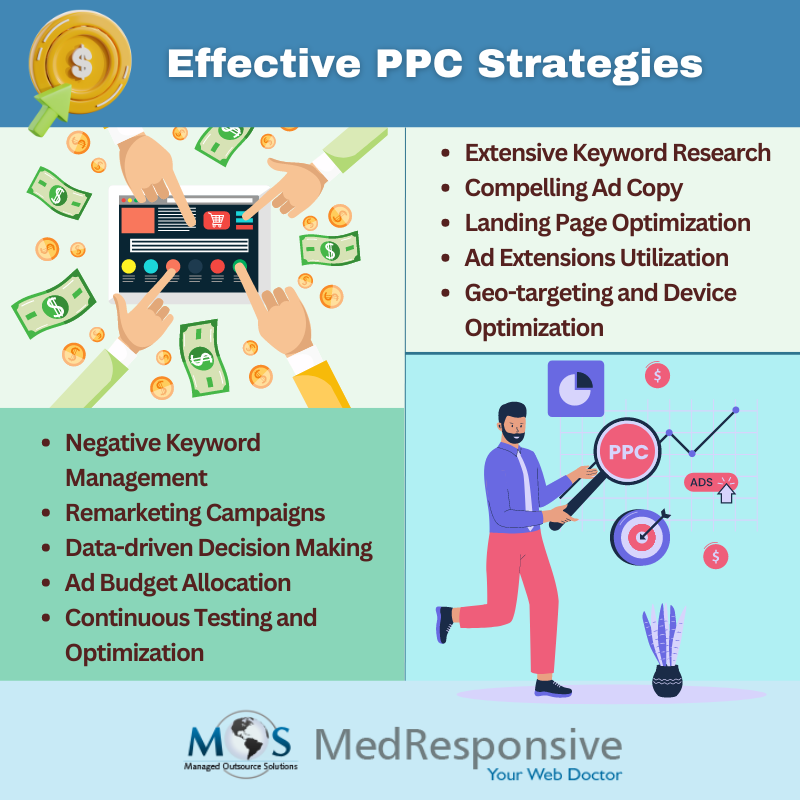In today’s digital age, where online visibility can make or break a business, mastering Pay-per-click (PPC) strategies is vital to achieve paid search success. With the constant evolution of the online landscape, staying ahead of the curve is crucial to ensure that your paid search efforts deliver the desired results. The art of PPC entails more than just bidding on keywords; it involves generating compelling ad copy, strategically targeting audiences, and optimizing campaigns for maximum impact. However, running a successful PPC campaign requires careful planning, keyword research, and continuous optimization. Partnering with professional organic SEO companies can assist in implementing an effective strategy to target new clients. Here is a look at the top ten effective PPC strategies that can propel your business to new heights in the competitive world of online advertising. Right from meticulous keyword research to leveraging cutting-edge ad extensions, each strategy plays a vital role in enhancing your campaign’s effectiveness and generating tangible returns on your investment.
Pay-Per-Click (PPC) Advertising – Top Strategies

Here discussed are 10 effective pay-per-click (PPC) advertising strategies that could help enhance your campaign’s effectiveness and boost lead generation –
-
- Extensive Keyword Research– One of the initial strategies of an effective PPC campaign is in-depth keyword research. Keyword selection directly impacts ad relevancy, click-through rates (CTR), and conversion rates. In order to identify relevant keywords with substantial search volume and low competition, you can utilize tools such as Google Keyword Planner, SEMrush, and Ahrefs. Often, long-tail keywords can provide highly targeted traffic and better cost efficiency.
- Compelling Ad Copy – A compelling ad copy may entice users to click on your ads. Highlight unique selling points, benefits, and calls to action (CTAs) within the character limit. A/B testing of different ad copies can help identify which resonates most with your audience, leading to higher CTRs and improved quality scores.
- Landing Page Optimization – Creating a persuasive ad is a key factor that helps attract potential leads. Ensure your content is relevant and informative, as this helps your leads to start building trust in your company. Creating a landing page for each ad, and making sure it delivers on the ads promise is a key element of any campaign. A landing page will serve as the real first impression of your business. A seamless transition from ad to landing page is vital for conversions. Ensure that your landing page is aligned with the ad’s message and offers a clear path for visitors to take the desired actions. Optimize loading speed, visual design, and content relevance to provide an exceptional user experience.
- Ad Extensions Utilization – Ad extensions are a unique way to highlight to a potential customer what you are trying to achieve. Ad extensions expand your ad’s visibility and provide additional information to users. Utilize site link, callout, and structured snippet extensions to share key details like product categories, additional benefits, and contact information. This extension could be a sign up for a free trial, sign up for updates, or even a contact us button.
- Geo-targeting and Device Optimization – Modify your ads to specific geographic locations and devices. Geo-targeting allows you to reach users in particular regions, ensuring your ads are relevant to their needs. Additionally, optimize your campaigns for mobile devices, as an increasing number of users browse and interact with ads through smartphones and tablets. By using the combined power of Google Ads and Analytics, you can give your campaigns a better chance of success by targeting those most likely to take the desired action.
- Negative Keyword Management – Negative keywords can be added to your search campaigns to prevent your ads from being displayed for unwanted or irrelevant searches. Use of these keywords can help save money, improve your click-through rate, and increase conversions.
- Remarketing Campaigns – Remarketing campaigns allows you to re-engage users who have previously interacted with your website. Setting up dynamic remarketing campaigns helps show tailored ads featuring products or services users have shown interest in. This strategy can significantly increase conversion rates by targeting users further along the purchasing funnel.
- Data-driven Decision Making – It is important to regularly analyze your campaign data to identify key trends, opportunities, and areas for improvement. Utilize analytics tools to track key performance indicators (KPIs) such as CTR, conversion rate, and return on ad spend (ROAS). Readjust your strategies based on the insights gained to continuously optimize your campaigns.
- Ad Budget Allocation – Try to allocate your ad budget strategically across campaigns and keywords that yield the best results. Monitor the performance of each campaign and adjust budget allocation on that basis. This approach ensures that resources are invested where they generate the highest returns.
- Continuous Testing and Optimization – PPC strategies require continuous testing and optimization. Experiment with different ad formats and targeting options to identify what works best for your business. Regularly improve your campaigns to stay ahead of evolving market dynamics.
Achieving paid search success in the world of PPC requires a combination of strategic planning, continuous experimentation, and data-driven decision-making. By incorporating the above ten effective PPC strategies into your campaigns, you can improve your online presence, drive quality traffic, and generate leads that contribute to your business’ growth and success. Relying on organic SEO services provided by professional digital marketing companies can help implement the right PPC campaign that would increase your website visibility and conversions.
Maximize ROI.
Our PPC management team is ready to help you grow your business!




